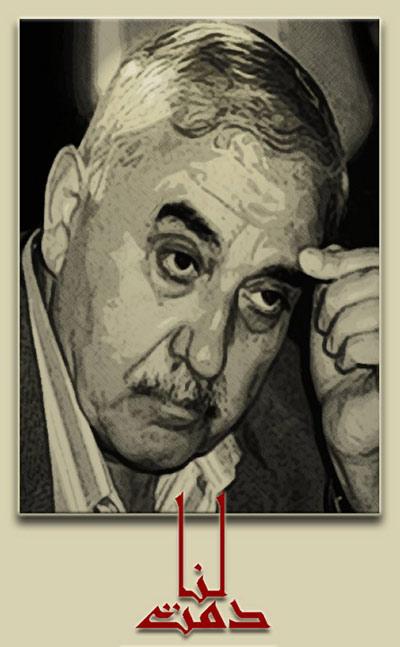Popular Front
for the Liberation of Palestine
The Journey of Al-Hakim [George Habash]: 1925-2008
 Comrade
Al-Hakim
was born on August 1, 1925 in the city of al-Lydd, Palestine; at the
time,
Palestine was under British colonial control under the British Mandate,
and
Palestinians were facing the materialization of the colonial settler
project
known today as Israel. Dr. Habash attended Anglican school and then
public
school in al-Lydd during his early education; he then studied at the
Orthodox
school in Yafa, before secondary school in Jerusalem. He completed high
school
in 1942. During his childhood years, he was deeply influenced by the
situation
in Palestine, including the Palestinian revolution which took place
between
1936 and 1939 against British colonialism and impending Zionist
colonialism. He
returned to Yafa after graduating high school, teaching for two years
in the
same school he attended before enrolling in the American University of
Beirut
in 1944 to study medicine.
Comrade
Al-Hakim
was born on August 1, 1925 in the city of al-Lydd, Palestine; at the
time,
Palestine was under British colonial control under the British Mandate,
and
Palestinians were facing the materialization of the colonial settler
project
known today as Israel. Dr. Habash attended Anglican school and then
public
school in al-Lydd during his early education; he then studied at the
Orthodox
school in Yafa, before secondary school in Jerusalem. He completed high
school
in 1942. During his childhood years, he was deeply influenced by the
situation
in Palestine, including the Palestinian revolution which took place
between
1936 and 1939 against British colonialism and impending Zionist
colonialism. He
returned to Yafa after graduating high school, teaching for two years
in the
same school he attended before enrolling in the American University of
Beirut
in 1944 to study medicine.
In 1948, while Comrade Habash was studying in Beirut, al-Nakba took place, in which over 700,000 Palestinians, including Dr. Habash's family and many other Palestinians in al-Lydd, were driven from their homes and made refugees. Along with other Palestinian and Arab comrades in Beirut, in response to al-Nakba, Dr. Habash founded the Arab Nationalist Movement. This movement became very strong among youth, students and intellectuals across the Arab world, and was the first pan-Arab movement to take up armed struggle to confront colonialism and to liberate occupied Arab land. After graduating with his medical degree in 1951, he participated in clinics serving Palestinian refugees in the camps in Jordan along with Comrade martyr Dr. Wadi' Haddad, while continuing his leadership of the Arab Nationalist Movement.
After the defeat of 1967, he and his comrades established the Popular Front for the Liberation of Palestine. The Palestinian revolution was under severe attack at the time, not only by Israel and imperialism, but also by reactionary forces and regimes in the Arab world. In Jordan, the Palestinian movement faced massacres at the hands of the regime, and was forced to flee to Lebanon, where a new base of the Palestinian revolution was established. In Lebanon, Dr. Habash continued his leadership of the Front throughout the civil war and the Israeli invasion, until 1982, when the PLO and its activists, fighters and institutions were forced to leave Lebanon. Al-Hakim and his comrades went to Damascus in 1982, after which he focused heavily on the establishment and development of institutions inside Palestine, as well as the protection of the Palestinian revolution's existence, recognizing as he did the dangers to Palestinian rights posed by the beginnings of the so-called "peace process;" for example, initiatives by U.S. President Ronald Reagan and Saudi Arabia's King Fahd and the so-called Amman agreement of 1985.
In 1987, with the outbreak of the great Intifada, Dr. Habash called for upholding Palestinian national unity, and convening the Palestinian National Congress in Algeria in 1988. Comrade Al-Hakim always understood national unity as a necessary condition for the continuation of the struggle and the national liberation movement, whether in Beirut during internal fighting among Palestinians and after as well, recognizing that the internal contradictions among Palestinians could not be solved through military mechanisms, but rather through the democratic processes of the liberation movement.
In 1993, when the Oslo agreement was signed, Comrade Al-Hakim called for maximum popular opposition to the agreement and saw in it a defeat to the Palestinian traditional leadership of the PLO. Dr. Habash warned that the Oslo agreement particularly targeted a central issue of the Palestinian national movement, the right to return. In 1994 and 1995, he called for internal and external meetings for Palestinian leaders and activists in exile, to launch campaigns and establish al-Awda committees and right to return organizations everywhere possible in order to protect this vital and central right for Palestinian refugees in light of the new threat posed by Oslo and its effects.
The Popular Front for the Liberation of Palestine convened its sixth conference in 2000, in which Dr. Habash participated, delivering his last address as General Secretary, before declaring his resignation from the post. He did this, providing an example for allowing the transfer of leadership within an organization through its democratic processes, which he upheld as a value that strengthened, rather than weakened, organizations and movements. The Front elected Abu Ali Mustafa to succeed Dr. Habash as General Secretary.
From 2000 through 2008, Dr. Habash established the al-Ghad al-Arabi center for studies and lived in Amman near his daughters and family. He is survived by his wife, Hilda and two daughters, Maysa and Lama.
Comrade
Al-Hakim,
throughout his life, demonstrated not only the highest level of care
and
dedication to his people, but also consistently and clearly conveyed
and
developed a scientific vision and analysis both of the future of the
revolution
and the dangers and plans against it forged by the enemies of his
people. Al-Hakim
has left us with a rich experience bearing many legacies from which we
can
benefit and learn, as we continue along his path until the liberation
of
Palestine.
Click here to return
to the
September 2007 index.